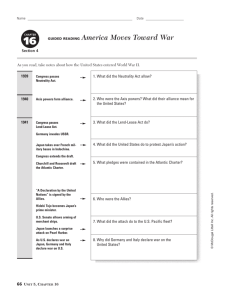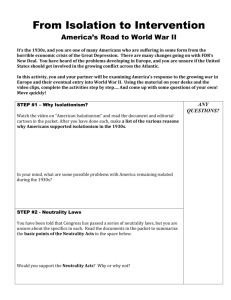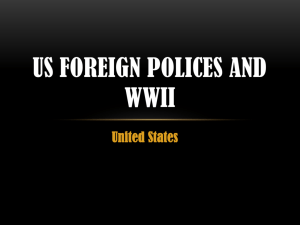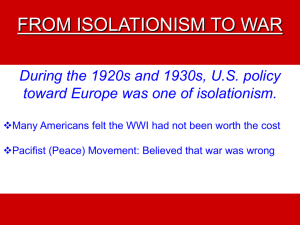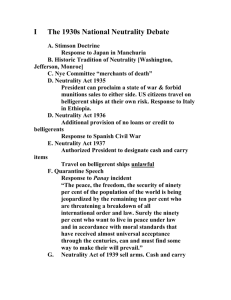FDR Speaks to the American People
advertisement
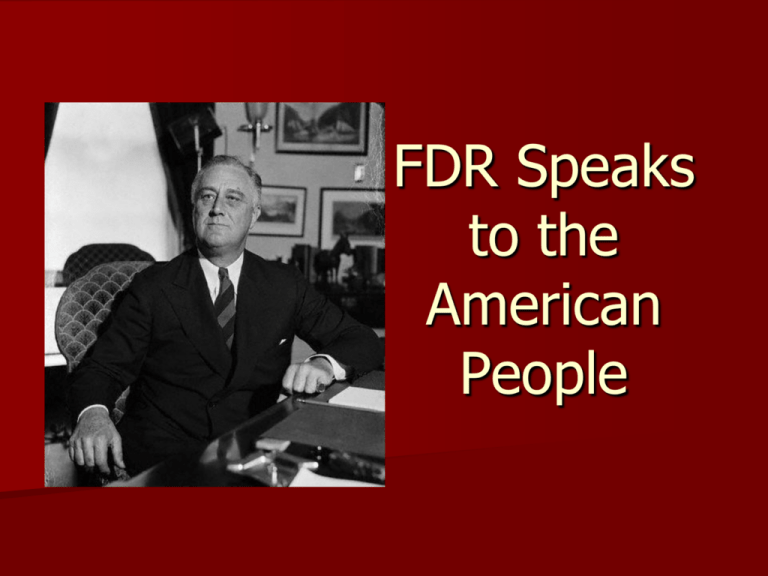
FDR Speaks to the American People Neutrality Acts An attempt to keep America out of another foreign conflict. Isolationism becomes policy. Neutrality Act 1935 – Embargo; Prohibited the sale of arms and war materials to belligerent nations. Also, warned citizens to travel at their own risk; 6 months Neutrality Act of 1936 – Extended ’35 act by 14 months; prohibited loan or credit to belligerent nations Neutrality Act of 1937 – Extended earlier acts w/out expiration; ships are prohibited from transporting passengers or articles to belligerents; US Citizens barred from traveling on ships of belligerent nations Quarantine Speech The Quarantine Speech was given by U.S. President [Franklin D. Roosevelt] on October 5, 1937 in [Chicago], calling for an international "quarantine of the aggressor nations" as an alternative to the political climate of American neutrality and non-intervention that was prevalent at the time. The speech intensified America's isolationist mood, causing protest by noninterventionists and foes to intervene. No countries were directly mentioned in the speech, although it was interpreted as referring to Japan, Italy, and Germany Isolationism to Intervention With events in Europe (Invasion of Poland and the Fall of France) more and more Americans see involvement in the war as inevitable. 1940 U.S. to Enter WWII Prior to entering World War II, 62% percent of the American public believes that defeating Germany is more important than staying out of the war. 1940 Peacetime Draft Enactment of the first peacetime military draft in U.S. history enjoys overwhelming support, with 89% saying it is "a good thing." Gallup Polls Cash and Carry Cash and carry was a policy requested by President Franklin Delano Roosevelt at a special session of Congress on September 21, 1939, as World War II was spreading throughout Europe. It replaced the Neutrality Acts of 1936. The revision allowed the sale of war materials to belligerents, provided 1.) the nation paid cash 2.) transported the items themselves 3.) assumed all risk Arsenal of Democracy December 29, 1940 – radio broadcast to the American people in which FDR promised to help the United Kingdom fight Nazi Germany by giving them military supplies while the United States stayed out of the actual fighting. ‘’A call to arm and support the Allies and China’’ Arsenal of Democracy We must be the great arsenal of Democracy. For us this is an emergency as serious as war itself. We must apply ourselves to our task with the same resolution, the same sense of urgency, the same spirit of patriotism and sacrifice as we would show were we at war. The experience of the past two years has proven beyond doubt that no nation can appease the Nazis. No man can tame a tiger into a kitten by stroking it. There can be no appeasement with ruthlessness. There can be no reasoning with an incendiary bomb. We know now that a nation can have peace with the Nazis only at the price of total surrender... The people of Europe who are defending themselves do not ask us to do their fighting. They ask us for the implements of war, the planes, the tanks, the guns, the freighters which will enable them to fight for their liberty and for our security. Lend Lease The Lend-Lease Act, approved by Congress in March 1941, gave President Franklin D. Roosevelt virtually unlimited authority to direct material aid such as ammunition, tanks, airplanes, trucks, and food to the war effort in Europe without violating America's official position of neutrality. By 1945 the Lend-Lease program had cost $49.1 billion, and over 40 nations had received aid in its name. FDR’s Garden Hose Analogy Well, let me give you an illustration: Suppose my neighbor's home catches fire, and I have a length of garden hose 400 or 500 feet away. If he can take my garden hose and connect it up with his hydrant, I may help him to put out his fire. Now, what do I do? I don't say to him before that operation, "Neighbor, my garden hose cost me $15; you have to pay me $15 for it." What is the transaction that goes on? I don't want $15—I want my garden hose back after the fire is over. All right. If it goes through the fire all right, intact, without any damage to it, he gives it back to me and thanks me very much for the use of it. But suppose it gets smashed up—holes in it—during the fire; we don't have to have too much formality about it, but I say to him, "I was glad to lend you that hose; I see I can't use it any more, it's all smashed up." He says, "How many feet of it were there?" I tell him, "There were 150 feet of it." He says, "All right, I will replace it." Now, if I get a nice garden hose back, I am in pretty good shape. Four Freedoms Jan 6th 1941- State of the Union Address to Congress In the future days, which we seek to make secure, we look forward to a world founded upon four essential human freedoms. The first is freedom of speech and expression -everywhere in the world The second is freedom of every person to worship God in his own way -everywhere in the world. The third is freedom from want -- which, translated into world terms, means economic understandings which will secure to every nation a healthy peacetime life for its inhabitants -everywhere in the world. The fourth is freedom from fear -- which, translated into world terms, means a world-wide reduction of armaments to such a point and in such a thorough fashion that no nation will be in a position to commit an act of physical aggression against any neighbor-anywhere in the world. Atlantic Charter August 1941 The Atlantic Charter was a pivotal policy statement first issued in August 1941 that early in World War II defined the Allied goals for the post-war world. It was drafted by Britain and the United States, and later agreed to by all the Allies. The United States And Great Britain agreed to seek no territorial gains as a result of the outcome of World War II. Any territorial adjustments would be made with the wishes of the affected people taken into consideration. Self-determination was a right of all people. They would work to establish freedom from fear and want. The importance of freedom of the seas was stated. They would work towards postwar disarmament and the mutual disarmament of aggressor nations. Significance of the Atlantic Charter The Allied nations agreed to the principles of the Atlantic Charter thus establishing a commonality of purpose. The Atlantic Charter was a significant first step towards the United Nations. Though the Atlantic Charter pledged no military support for the war in Europe it had the impact of signaling the United States as a major player on the world stage. This was a position that the United States would firmly hold after World War II in its efforts to rebuild a war torn Europe.
